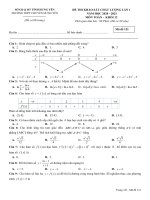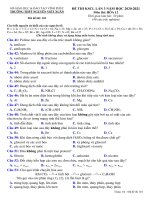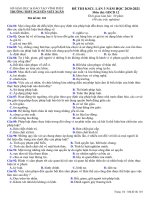Đề cương ôn tập học kì 2 môn Tiếng Anh lớp 11 thí điểm năm 2020 - 2021 THPT chuyên Bảo Lộc có đáp án | Tiếng Anh, Lớp 11 - Ôn Luyện
Bạn đang xem bản rút gọn của tài liệu. Xem và tải ngay bản đầy đủ của tài liệu tại đây (137.13 KB, 7 trang )
<span class='text_page_counter'>(1)</span><div class='page_container' data-page=1>
SỞ GDĐT LÂM ĐỒNG
<b>TRƯỜNG THPT CHUYÊN BẢO LỘC</b>
<b>ĐỀ CƯƠNG KIỂM TRA CUỐI KÌ II </b>
<b>NĂM HỌC 2020-2021</b>
<b>TIẾNG ANH, Lớp 11 (chương trình Thí Điểm)</b>
<b>A. Scope: From Unit 6 to Unit 10</b>
<b>I. Stress: words with two or three syllables</b>
<b>II. Vocabulary: </b>
Unit 6 Global warming
Unit 7 Further education
Unit 8 Our World Heritage Sites
Unit 9 Cities of the future
Unit 10 Healthy lifestyle and longevity
III. Grammar:
1. Perfect gerunds and perfect participles
2. The present perfect and the present perfect continuous
3. Participle and to-infinitive clauses
4. Question tags
5. Conditional sentences type 0
6. Reported speech with conditionals
7. Reported speech with to-infinitives and gerunds
<b>IV. Reading: </b>
Topics:
Unit 6 Global warming
Unit 7 Further education
Unit 8 Our World Heritage Sites
Unit 9 Cities of the future
Unit 10 Healthy lifestyle and longevity
<i><b>1. Reading comprehension</b></i>
<i><b>2. Cloze reading</b></i>
Knowledge & Skills:
+ Vocabulary
+ Functional words/ phrases: Conjunctions, prepositions, Relative pronouns, Word forms
+ Collocation/ Idiomatic expressions/ Fixed phrases
<b>V. Listening: </b>
</div>
<span class='text_page_counter'>(2)</span><div class='page_container' data-page=2>
Unit 7 Further education
Unit 8 Our World Heritage Sites
Unit 9 Cities of the future
Unit 10 Healthy lifestyle and longevity
Task types: True / False, Gap-filling, MCQs
<b>VI. Speaking: </b>
Unit 6 Global warming
Unit 7 Further education
Unit 8 Our World Heritage Sites
Unit 9 Cities of the future
Unit 10 Healthy lifestyle and longevity
<b>VII. Writing: </b>
<i><b>1. Sentence transformation</b></i>
Tenses: Past Simple & Present Perfect
Modals verbs: Should – ought to; Must – have to
Cleft sentences: It is/was … that …
Adj /noun + To- infinitive
Gerunds
<i><b>2. Paragraph writing + letter writing</b></i>
Writing an email to a friend about city life in the future
Writing a story about how young people have changed their lifestyle to overcome a problem
<b>B. EXRCISES</b>
<b>I. PHẦN TỰ LUẬN</b>
<b>VOCABULARY</b>
<b>Give the correct form of the word in brackets to complete each of the following sentences. (0.5 point)</b>
1. Noise pollution seems to be a(n) ____________________ problem in big cities. (SOLVE)
2. In a smart city, waste is ____________________ sorted and treated. (AUTOMATIC)
3. The average life ____________________ of Japanese people is about 83.7 years of age. (EXPECT)
4. Developments in technology play an important role in ____________________ the quality of life.
(PROLONG)
5. Environmental groups want a significant reduction in the ____________________ of greenhouse gases.
(EMIT)
<b>WRITING</b>
<b>1. For each question, complete the new sentence so that it means the same as the given one using NO </b>
<b>MORE THAN FIVE WORDS.</b>
<b>An example has been done for you.</b>
<i>0. Daniel started Italian classes six months ago.</i>
<i>-> Daniel has had Italian classes ………for………….. six months. </i>
1. “Why don’t you do yoga? It’ll help you relieve stress,” Nga said.
</div>
<span class='text_page_counter'>(3)</span><div class='page_container' data-page=3>
-> ________________________________________ a good way to reduce your carbon footprint.
3. My brother reminded me to go to class on time.
-> “Don’t ________________________________________ to class on time,” said my brother.
4. “I’m sorry that I shouted at you,” said Peter.
-> Peter ________________________________________ at me.
5. “You will get a promotion if you work hard,” Jane’s boss said.
-> Jane’s boss promised ________________________________________ worked hard.
<b>2. For each question, write a new sentence so that it means the same as the original one. You must </b>
<b>use the given word.</b>
<b>An example has been done for you.</b>
<i>0. Daniel started Italian classes six months ago. (FOR)</i>
<i>-> Daniel’s had Italian classes for six months.</i>
1. “You should take a yoga class to relieve stress, Van,” her doctor said. (ADVISED)
-> __________________________________________________________________________
2. She complains all the time about the teachers. (KEEP)
-> __________________________________________________________________________
3. It was difficult for Sarah to learn to read in Japanese. (DIFFICULTY)
-> __________________________________________________________________________
4. “I didn’t follow my doctor’s advice,” the patient said. (ADMITTED)
-> __________________________________________________________________________
5. Chiara spent years trying to pass the First Certificate exam. (TOOK)
-> __________________________________________________________________________
<b>3.1. Write a paragraph (100-120 words) on the following topic</b>
<i>What should teenagers to do take good care of their skin?</i>
<b>Give reasons and/or examples to support your points. </b>
……….
……….
……….
……….
……….
……….
……….
……….
……….
……….
……….
……….
<b>3.2. Write a paragraph (100-120 words) on the following topic</b>
<i>Doing regular exercise is beneficial to young people.</i>
<b>Give reasons and/or examples to support your points.</b>
</div>
<span class='text_page_counter'>(4)</span><div class='page_container' data-page=4>
<b>LANGUAGE</b>
<b>Choose the letter A, B, C, or D to indicate the word that differs from the other three in the position of</b>
<b>primary stress in each of the following questions. (0.5 point)</b>
1. A. royal B. scenic C. talent D. abroad
2. A. supportive B. nutritious C. infectious D. subsequent
3. A. development B. necessity C. humidity D. definition
4. A. impossible B. sustainable C. harmonious D. fascinating
5. A. responsible B. nutritious C. particular D. mandatory
<b>Choose the letter A, B, C, or D to indicate the correct answer to each of the following questions (1.5</b>
<b>points)</b>
6. John said that he _________ work for a new company the following month.
A. was A. was
7. The factory was heavily fined for _________ tons
of toxic waste into the river.
7. The factory was heavily fined for _________ tons
of toxic waste into the river.
A. having dumped
8. I have tried to ring you all day! Where _________
you _________?
8. I have tried to ring you all day! Where _________
you _________?
A. are … being A. are … being
9. _________ some candies, the boy stopped crying.
A. To give A. To give
10. _________ away from the castle, Cinderella lost a
shoe. 10. _________ away from the castle, Cinderella lost a shoe.
A. To run
11. We were sitting in the bus shelter _________ for
the rain to stop. 11. We were sitting in the bus shelter _________ for the rain to stop.
A. wait A. wait
12. The documentary _________ last Monday was a great success.
A. broadcast A. broadcast
13. There will be no private cars in the future,
_________?
13. There will be no private cars in the future,
_________?
A. is there
<b>READING</b>
<b>1. Read the passage about tourism in Wales and circle the best option (A, B, C, or D) to fill in each </b>
<b>numbered blank. An example has been done for you.</b>
It is estimated that in north Wales 30 per cent of all jobs can be directly attributed to tourism, but the fact
that visitors spend their money in a (0)____________ of ways has a beneficial effect on other things too.
Many village shops would have to close if they were not supported by (1)____________ from tourists, and
the money spent on local souvenirs can (2)____________ local industries from going out of business.
Unfortunately, tourism also has disadvantages. For example, many of the roads in the Snowdonia area are
extremely (3)____________ and tourist cars cause traffic jams. Some farmers and local merchants
complain that they make it difficult for them to do their work as car parks full up during busy periods and
many visitors cause (4)____________ by parking across gateways, etc. In addition, in the summer,
thousands of people use the network of footpaths across Snowdon and its foothills. Often the grassy
(5)____________ is worn away, leaving rough stone or mud. This makes the paths hard to see, and it can
be dangerous to walk on.
0. A. selection B. choice C. variety D. difference
1. A. fortune B. income C. wages D. wealth
2. A. prevent B. damage C. avoid D. hurt
3. A. thin B. narrow C. slim D. slender
4. A. struggles B. challenges C. obstructions D. obstacles
5. A. level B. surface C. height D. exterior
</div>
<span class='text_page_counter'>(5)</span><div class='page_container' data-page=5>
In 1959, the government of Egypt was working on a plan to build a dam on the River Nile. It was called the
Aswan Dam, and it was intended to generate electricity and allow the river water to be used for agriculture.
There was one big problem with the plan, though. The dam would flood a nearby valley that contained
ancient Egyptian treasures, including two enormous stone temples.
It can be difficult for governments to choose culture and history over economics. However, if countries
always made decisions like this, the majority of the world's ancient sites would end up being destroyed.
Luckily, UNESCO stepped in. They formed a committee that tried to convince Egypt to protect its ancient
treasures. With support from many countries, they were finally successful. The huge temples were
carefully removed from their original site and moved to a safe location so that the dam could be built.
After their success in saving the temples in Egypt, UNESCO went on to save more sites around the world.
They protected lagoons in Venice, ruins in Pakistan, and temples in Indonesia. With industrialisation
changing the world rapidly, there were many sites that needed to be saved. Eventually, UNESCO formed
the World Heritage Organisation to protect important natural and historic sites wherever it was necessary.
By now, the World Heritage Organisation has protected hundreds of sites ranging from beautiful natural
islands to buildings in large cities and ancient ruins. If you're able to visit any of the many protected sites,
you'll agree it was worth it.
1. What is the best title for the passage?
A. UNESCO
B. UNESCO to succeed C. UNESCO to developD. UNESCO to rescue
2. The word “this” in paragraph 2 refers to ____________.
A. culture
B. decision C. countryD. economics
3. What is meant by the first sentence of the second paragraph?
A. Most governments prefer to sell their treasures.
B. Money sometimes seems more important than all other things.
C. Governments are never able to consider two things at once.
D. Governments usually don't know anything about their culture.
4. Why did UNESCO get involved in Egypt?
A. Egypt was planning to build a dam that would harm ancient temples.
B. Egypt was planning to build a valley for agriculture and electricity.
C. Egypt was planning to create a dam right on top of an ancient temple.
D. When the dam flooded a valley, several treasures were discovered.
5. Why is the World Heritage Organisation more important now than it would have been 200 years ago?
A. Countries didn't cooperate in the past.
B. Cities were smaller back then.
C. There were not as many interesting sites 200 years ago.
D. Modern business and production are changing the world.
<b>Read the passage and do the tasks that follow.</b>
Super skyscrapers, underwater cities, 3D-printed homes, and holidays in space will all be a reality in 100
years' time, according to the SmartThings Future Living Report. The report presented findings from a
survey conducted by Samsung’s SmartThings company with a group of experts on space, architecture, and
urban planners. Several futurologists and adults of different occupations also took part in the survey.
The experts suggest that in a century's time humans will be able to live in 'Earth-scrapers', which will go
up to 25 storeys underground. They also believe that 'bubble cities' will be created underwater making the
depths habitable for humans. They say the way we live, work and play will be totally different to how we
do these things today. The authors of the report say that 25 years ago, people could not imagine how the
Internet and smartphones would change our lives. They have revolutionised the way we communicate,
learn and do daily things. So, it is understandable that the changes in the next century would be even more
unbelievable.
</div>
<span class='text_page_counter'>(6)</span><div class='page_container' data-page=6>
and give us treatment. We will also go into space for holidays and to get resources that we have used up on
Earth. A prediction that was missing was about the popularity of English – whether people would still need
to study English or not.
<b>For each question, circle the correct option (A, B, C, or D).</b>
1. What is the passage mainly about?
A. the development of SmartThings
B. a survey with students
C. the future of English learning
D. life in the next century
2. The word “Earth-scrapers” in paragraph 2 means ____________.
A. earthen buildings
B. super sky cities
C. underground buildings
D. cities in the water
3. The word “habitable” in paragraph 2 is closest in meaning to ____________.
A. eligible
B. enjoyable
C. livable
D. responsible
4. The word “They” in paragraph 2 refers to ____________.
A. Internet and smartphones
B. people
C. the authors
D. the changes
5. The word “which” in paragraph 3 refers to ____________.
A. home
B. visit C. the doctorD. health capsule
<b>Give short answer to each of the questions. Use NO MORE THAN THREE WORDS AND/OR A </b>
<b>NUMBER from the passage.</b>
6. Who owns SmartThings company?...
7. How many adults took part in the survey? ...
8. What form of meetings will be common for office workers in the next century? ...
9. What will help people print their furniture at home? ...
10. What did the survey respondents not predict about? ...
<b>WRITING</b>
<b>Choose the letter A, B, C, or D to indicate the underlined part that needs correction. (0.5 point)</b>
1. I sent a card to the girl lived across the street.
A B C D
2. The doctor treated me told me not to worry.
A B C D
<b>LISTENING </b>
<b>1. Listen to a passage about the Pacific Island of Vanuatu. Write the answer to each question. Use </b>
<b>NO MORE THAN SIX WORDS for each answer. You will listen to the recording TWICE.</b>
1. What is the population of Vanuatu?
______________________________________________________________________
2. What do most people here live on?
______________________________________________________________________
3. How many languages are spoken officially in Vanuatu?
______________________________________________________________________
5. What is this group of islands mostly like?
______________________________________________________________________
6. How high is the majority of the Vanuatu land mass?
______________________________________________________________________
<b>2. Listen to a conversation between a husband and his wife about keeping fit. For each question, </b>
<b>circle the right answer (A, B, C, or D). You will listen to the recording TWICE.</b>
1. What does the man want to do?
A. play basketball with his colleagues C. organise a sport team
B. join the company baseball team D. compete in a cycling race
2. What is the woman's main concern about her husband?
</div>
<span class='text_page_counter'>(7)</span><div class='page_container' data-page=7>
B. He cannot run fast. D. He is obese.
3. What is the woman's first suggestion to her husband?
A. He should practise before playing. C. He should visit a fitness trainer.
B. He should check his timetable. D. He should see a doctor.
4. What does the woman imply about the man's diet at the moment?
A. He should eat more fatty food. C. He’s having not enough vegetable.
B. He’s consuming too little fish. D. He’s having enough vegetable.
5. Why does the woman recommend her husband to work out?
A. He goes to bed too early. C. It’s better than watching TV.
B. It helps build his muscles. D. His heart can be strengthened.
<i>SPEAKING </i>
<i><b>Unit 6 Global warming </b></i>
Talk about solutions to global warming
<i><b>Unit 7 Further education</b></i>
Talk about types of further education, and your preferences to different further education pathways
<i><b>Unit 8 Our World Heritage Sites</b></i>
Talk about cultural and natural sites in Viet Nam that you want to visit
Which attractions do you think we should visit in Hue/Hoi An….?
<i><b>Unit 9 Cities of the future</b></i>
Talk about problems some cities in Viet Nam face, solutions to these cities and make predictions about a
future city in Viet Nam
What will your city be like in the next 50 years? Do you think it will be a better place to live in?”
<i><b>Unit 10 Healthy lifestyle and longevity </b></i>
</div>
<!--links-->









